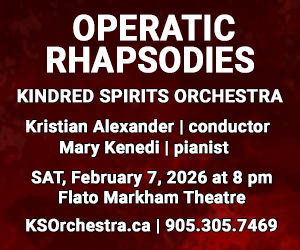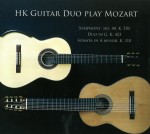 There was never any doubt about what would be the lead review once I received HK Guitar Duo Plays Mozart, the latest CD from two of Canada’s most outstanding instrumentalists, guitarists Drew Henderson and Michael Kolk (Independent, hkguitarduo.com).
There was never any doubt about what would be the lead review once I received HK Guitar Duo Plays Mozart, the latest CD from two of Canada’s most outstanding instrumentalists, guitarists Drew Henderson and Michael Kolk (Independent, hkguitarduo.com).
What I wasn’t expecting, though, even from them, was the first of the three transcriptions on the disc – the complete Symphony No.40 in G Minor K550, the idea for the arrangement growing from some impromptu improvising on the opening theme during a break in a 2008 recording session.
Transcribing the Duo No.1 in G Major for Violin and Viola K423 was, as Kolk readily admits, a much simpler process, and finding an arrangement for two violins of the Piano Sonata No.8 in A Minor K310 clearly assisted with their excellent transcription for two guitars. Henderson plays a custom-built eight-string guitar in the Symphony No.40 as well as in the middle Adagio movement of the Duo, the two extra bass strings enabling an extended bass range that was particularly essential for the symphony.
The playing throughout the CD is immaculate, the technical artistry always matched by the musical sensitivity and intelligence. The Duo and the Piano Sonata are not exactly insubstantial works, but the real gem here is the Symphony No.40: “It’s incredible,” says the accompanying promo blurb, “that four hands and 14 strings can cover so much music that was written for an orchestra, but the HK Duo makes it sound effortless.”
Indeed they do, but more significantly – and crucially – they also make it sound both musically and artistically meaningful and an immensely satisfying listening experience in all respects. It’s a quite astonishing technical and musical accomplishment, completely convincing through all four movements.
Engineered and edited by Drew Henderson to his usual impeccable standards at the Church of St. Mary Magdalene in Toronto, this is a simply outstanding guitar CD.
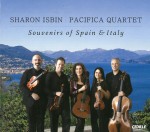 By sheer coincidence, for the second month in a row I received a guitar quintet CD that opened with the Mario Castelnuovo-Tedesco Quintet for Guitar and String Quartet Op.143 and closed with Luigi Boccherini’s Quintet for Guitar and String Quartet in D Major – the one with the famous Fandango final movement. Last month it was Jason Vieaux and the Escher Quartet, and this month it’s guitarist Sharon Isbin and the Pacifica Quartet on Souvenirs of Spain & Italy, a CD that features music by Italian-born composers influenced by Spanish idioms (Çedille CDR 90000 190 cedillerecords.org).
By sheer coincidence, for the second month in a row I received a guitar quintet CD that opened with the Mario Castelnuovo-Tedesco Quintet for Guitar and String Quartet Op.143 and closed with Luigi Boccherini’s Quintet for Guitar and String Quartet in D Major – the one with the famous Fandango final movement. Last month it was Jason Vieaux and the Escher Quartet, and this month it’s guitarist Sharon Isbin and the Pacifica Quartet on Souvenirs of Spain & Italy, a CD that features music by Italian-born composers influenced by Spanish idioms (Çedille CDR 90000 190 cedillerecords.org).
The other works on the CD are Vivaldi’s popular Lute Concerto in D Major RV93, heard here in Emilio Pujol’s arrangement for guitar and string trio, and Joaquín Turina’s La oración del torero Op.34 in the composer’s own string quartet edition of the original for lute quartet.
Perhaps the words “seldom-heard gem” are finally becoming inappropriate for the gorgeous Castelnuovo-Tedesco quintet, which would be welcome news. There may possibly be a bit more warmth and tonal colour in Vieaux’s playing and a slightly less-forward guitar balance, but both performances feature excellent work by the soloists backed by beautiful quartet playing, and can be recommended without reservation.
The two performances of the Boccherini quintet are also very similar and equally impressive, the main difference being the addition of castanets and tambourine for almost the entire Fandango on this current disc, whereas on the Vieaux, the castanets (no tambourine) only appear for a brief single spell in the middle of the movement.
Isbin adds her own Baroque ornamentation in a measured and thoroughly enjoyable performance of the Vivaldi concerto; indeed, the two middle works on this CD give it a decided edge over the Vieaux disc.
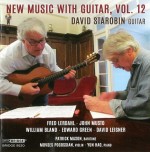 David Starobin is the classical guitar soloist on New Music with Guitar Vol.12, the latest CD in the excellent ongoing series on the Bridge label (9520 bridgerecords.com).
David Starobin is the classical guitar soloist on New Music with Guitar Vol.12, the latest CD in the excellent ongoing series on the Bridge label (9520 bridgerecords.com).
All five composers represented – Fred Lerdahl, John Musto, William Bland, Edward Green and David Leisner – were born between 1943 and 1954, and the works are predominantly mature pieces, only Green’s Genesis: Variations for Solo Guitar, written for Starobin in 1974 and recorded in 1975, predating 2010.
Starobin is joined by violinist Movses Pogossian in Lerdahl’s Three Bagatelles (2017) and by pianist Yun Hao in Bland’s Sonata No.4 (2016), the latter’s Blues final movement ending effectively with Starobin unwinding the lower guitar strings.
The outstanding baritone Patrick Mason joins the guitarist in two brief but quite superb song cycles: Musto’s The Brief Light (2010) on poems of James Laughlin and Leisner’s Three James Tate Songs (2007). Leisner’s abilities as a virtuoso guitarist make for some dazzling and imaginative settings in the latter.
Starobin and partners are all in top form in a highly entertaining program.
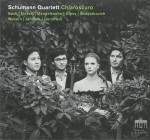 Chiaroscuro, the latest CD from the Schumann Quartet completes the trilogy of concept albums that began with the two CDs, Landscapes (2017) and Intermezzo (2018) (Berlin Classics 0301213BC berlin-classics-music.com).
Chiaroscuro, the latest CD from the Schumann Quartet completes the trilogy of concept albums that began with the two CDs, Landscapes (2017) and Intermezzo (2018) (Berlin Classics 0301213BC berlin-classics-music.com).
Described as “a picture-gallery of music” the album uses Mozart’s settings of Five Fugues from Bach’s The Well-Tempered Clavier K405 as the promenade music and connecting path between the various works: Mendelssohn’s Fugue in E-Flat Major Op.81 No.4; Philip Glass’ brief String Quartet No.2 “company”; Shostakovich’s Two Pieces for string quartet from 1931; Webern’s Six Bagatelles Op.9; and Janáček’s String Quartet No.2 “Intimate Letters.” Gershwin’s Lullaby adds a dream-like epilogue to the series.
The Schumann Quartet is performing the complete Chiaroscuro program in their live recitals, and recommends that the CD be listened to from start to finish without a break. It certainly works very well, despite – or perhaps because of – the disparity between the musical selections. Performances throughout are excellent, particularly the heartfelt reading of the astonishingly raw and emotional Janáček quartet.
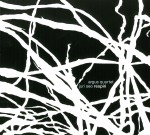 The string music of the American composer Juri Seo (born 1981) is featured on the impressive CD Respiri, with the Argus Quartet and cellist Joann Whang (Innova 022 innova.mu).
The string music of the American composer Juri Seo (born 1981) is featured on the impressive CD Respiri, with the Argus Quartet and cellist Joann Whang (Innova 022 innova.mu).
The quite lovely title track for string quartet is subtitled in memoriam Jonathan Harvey, and pays tribute to the British composer – a practising Buddhist – who died in 2012, and whose signature musical gesture was an evocation of breathing.
Whang is the soloist for the Suite for Cello, a suite of five dance movements very much in the J.S. Bach solo cello mode but with an increasing use of harmonics, adding what the composer terms a lingering sense of displacement.
The String Quartet – Infinite Season aims to depict the story of a year unfolding, the four movements tracing the sounds of nature as the seasons change. There’s a lovely use of harmonics again, together with field recordings of birdsong and insect noises.
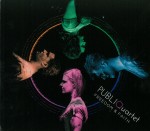 Freedom & Faith is the second album from the American string quartet PUBLIQuartet on the Bright Shiny Things label (BSTC-0126 brightshiny.ninja). The quartet is dedicated to presenting new works, and the music here is from two of PUBLIQuartet’s signature initiatives: MIND I THE I GAP, collaborative compositions and improvisations by the four group members; and PUBLIQ Access, a program that commissions new string quartet works by composers living in the United States. The latter is represented by the opening and closing works – Jessica Meyer’s three-movement Get into the Now from 2017 and Shelley Washington’s Middleground from 2016 – while three collaborative creations from the former project are at the centre of the disc: Sancta Femina, reflections on Hildegard von Bingen, Francesca Caccini and Chiara Margarita Cozzolani; Ella!, based on Ella Fitzgerald’s performance of A-Tisket, A-Tasket; and Nina!, a celebration of Nina Simone.
Freedom & Faith is the second album from the American string quartet PUBLIQuartet on the Bright Shiny Things label (BSTC-0126 brightshiny.ninja). The quartet is dedicated to presenting new works, and the music here is from two of PUBLIQuartet’s signature initiatives: MIND I THE I GAP, collaborative compositions and improvisations by the four group members; and PUBLIQ Access, a program that commissions new string quartet works by composers living in the United States. The latter is represented by the opening and closing works – Jessica Meyer’s three-movement Get into the Now from 2017 and Shelley Washington’s Middleground from 2016 – while three collaborative creations from the former project are at the centre of the disc: Sancta Femina, reflections on Hildegard von Bingen, Francesca Caccini and Chiara Margarita Cozzolani; Ella!, based on Ella Fitzgerald’s performance of A-Tisket, A-Tasket; and Nina!, a celebration of Nina Simone.
Anything goes in the performances at times, with normal string playing being replaced by a whistle, unison singing and chanting, rhythmic clapping and percussive effects on the instrument bodies in some vibrant and decidedly upbeat music.
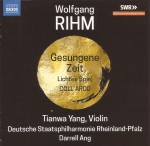 The outstanding violinist Tianwa Yang is the soloist on Wolfgang Rihm Music for Violin and Orchestra Vol.2 with the Deutsche Staatsphilharmonie Rheinland-Pfalz under Darrell Ang (Naxos 8.573667 naxosdirect.com). Yang has a strong association with Rihm’s music, having already recorded his Complete Works for Violin and Piano (8.572730) and the first volume of the Violin and Orchestra Music (8.573812) for the Naxos label.
The outstanding violinist Tianwa Yang is the soloist on Wolfgang Rihm Music for Violin and Orchestra Vol.2 with the Deutsche Staatsphilharmonie Rheinland-Pfalz under Darrell Ang (Naxos 8.573667 naxosdirect.com). Yang has a strong association with Rihm’s music, having already recorded his Complete Works for Violin and Piano (8.572730) and the first volume of the Violin and Orchestra Music (8.573812) for the Naxos label.
The three substantial works here are Gesungene Zeit (Musik für Violine und Orchester Nr.2) (1991-92), Lichtes Spiel (Ein Sommerstück für Violine und kleines Orchester) (2009) and COLL’ARCO (Musik für Violine und Orchester Nr.4) (2008).
Rihm’s music is not always immediately accessible, but these works are engrossing from start to finish with some truly beautiful moments, especially in the lengthy COLL’ARCO, which with its hints of Alban Berg often sounds like a violin concerto from the Second Viennese School.
Yang is, as usual, simply brilliant in music that makes great technical and interpretative demands.
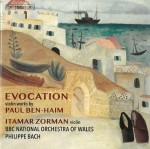 Evocation – Violin Works by Paul Ben-Haim traces the gradual assimilation of Middle Eastern influences in the music of the composer (born Paul Frankenburger in Munich, Germany) after his emigration to the British Mandate of Palestine (the future Israel) in the 1930s. Itamar Zorman is the violin soloist with the BBC National Orchestra of Wales under Philippe Bach (BIS-2398 bis.se).
Evocation – Violin Works by Paul Ben-Haim traces the gradual assimilation of Middle Eastern influences in the music of the composer (born Paul Frankenburger in Munich, Germany) after his emigration to the British Mandate of Palestine (the future Israel) in the 1930s. Itamar Zorman is the violin soloist with the BBC National Orchestra of Wales under Philippe Bach (BIS-2398 bis.se).
The major works are the 1942 title track and the Violin Concerto from 1960, a solidly professional work with a simply lovely Andante affettuoso slow movement. Pianist Amy Yang joins Zorman for the Berceuse sfaradite from 1945 and Three Songs without Words from 1951.
The Three Studies for Solo Violin, written for Yehudi Menuhin in 1981 are among Ben-Haim’s last works. An arrangement for violin and orchestra of the Toccata piano solo from 1943 by the soloist’s father, Moshe Zorman, completes an entertaining CD.
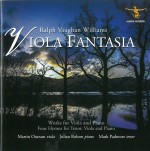 Vaughan Williams enjoyed playing the viola for most of his long life, its sound a seemingly perfect projection of the pastoral and nostalgic nature (on the surface, at least) of his music. On Viola Fantasia, on Albion Records, the official label of the Ralph Vaughan Williams Society, violist Martin Outram and pianist Julian Rolton perform the composer’s works for viola and piano, together with the Four Hymns for Tenor, Viola and Pianoforte with tenor Mark Padmore (ALBCD 036 albionrecords.org).
Vaughan Williams enjoyed playing the viola for most of his long life, its sound a seemingly perfect projection of the pastoral and nostalgic nature (on the surface, at least) of his music. On Viola Fantasia, on Albion Records, the official label of the Ralph Vaughan Williams Society, violist Martin Outram and pianist Julian Rolton perform the composer’s works for viola and piano, together with the Four Hymns for Tenor, Viola and Pianoforte with tenor Mark Padmore (ALBCD 036 albionrecords.org).
The Suite and Romance both sprang from Vaughan Williams’ relationship with the viola virtuoso Lionel Tertis. Six Studies in English Folk Song and the Fantasia on Sussex Folk Tunes both originally featured solo cello, the former heard here in the composer’s alternate viola version and the latter in an arrangement by Outram. The Fantasia on Greensleeves was arranged for viola and piano by another British viola virtuoso, Watson Forbes.
There’s perhaps a tendency for the viola tone to sound a bit tight at times, but there’s much to enjoy on what is clearly an authoritative CD.
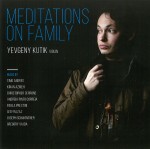 For his recording project Meditations on Family the Russian-American violinist Yevgeny Kutik commissioned eight composers to translate a family photo into a short musical miniature of about two to three minutes in length for violin and various ensemble. The resulting tracks were released digitally on a weekly basis, and were gathered together on a 23-minute Extended Play CD earlier this year (Marquis 774718149329 marquisclassics.com).
For his recording project Meditations on Family the Russian-American violinist Yevgeny Kutik commissioned eight composers to translate a family photo into a short musical miniature of about two to three minutes in length for violin and various ensemble. The resulting tracks were released digitally on a weekly basis, and were gathered together on a 23-minute Extended Play CD earlier this year (Marquis 774718149329 marquisclassics.com).
Composers Christopher Cerrone, Gregory Vajda, Joseph Schwantner, Kinan Azmeh, Paola Prestini, Timo Andres, Andreia Pinto Correia and Gity Razaz produced brief but intriguing works for solo violin, violin and piano, violin and double bass, violin and clarinet and violin with vocal quartet and glass harmonica. Kutik plays them with warmth and commitment.
The original photos, along with additional background information and audio tracks can be found at meditationsonfamily.com



